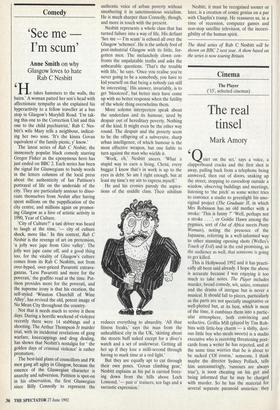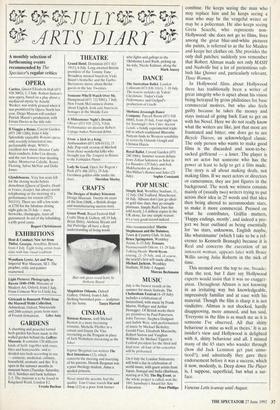Cinema
The Player ('15', selected cinemas)
The real tinsel
Mark Amory
uiet on the set,' says a voice, a clapperboard cracks and the first shot is away, pulling back from a telephone being answered, then out of doors, snaking up the street, stopping to eavesdrop outside a window, observing buildings and meetings, listening to 'the pitch' as some writer tries to convince a studio to greenlight his uno- riginal project (The Graduate II, in which Mrs Robinson has an old mother with a stroke: 'This is funny ?"Well, perhaps not a stroke . . . ', or Goldie Hawn among the pygmies, sort of Out of Africa meets Pretty Woman), noting the presence of the Japanese, referring in a well-informed way to other stunning opening shots (Welles's Touch of Evil) and in the end promising, to the audience as well, that someone is going to get killed.
This is Hollywood 1992 and it has practi- cally all been said already. I hope the above is accurate because I was enjoying it too much to take notes. The Player includes murder, broad comedy, wit, satire, romance and the drama of intrigue but is never a musical. It should fall to pieces, particularly as the parts are not specially imaginative or well-plotted but, at its best, which is most of the time, it combines them into a partic- ular atmosphere, both convincing and seductive. Griffin Mill (played by Tim Rob- bins with little-boy charm — a shifty, devi- ous little boy who steals sweets) is a studio executive who is receiving threatening post- cards from a writer he has rejected, and at the same time worries that he is about to be sacked ('Of course,' someone, I think maybe the director Sydney Pollack, tells him unreassuringly, 'rumours are always true'), is soon cheating on his girl and being informed that he may be charged with murder. So he has the material for several separate paranoid anxieties: they
combine. He keeps seeing the man who may replace him and he keeps seeing a man who may be the vengeful writer or may be a policeman. He also keeps seeing Greta Scacchi, who represents non- Hollywood: -she does not go to films, lives among the great blue-and-white pictures she paints, is referred to as the Ice Maiden and keeps her clothes on. She provides the only dull patches; suddenly you remember that Robert Altman made not only MASH and Nashville but a lot of pretentious rub- bish like Quintet and, particularly relevant, Three Women.
In Hollywood films about Hollywood there has traditionally been a writer of great integrity who is upset about his vision being betrayed by gross philistines for base commercial motives, but who also feels guilty because he takes the money and stays instead of going back East to get on with his Novel. Here we do not really know what the writers are like, just that most are frustrated and bitter; one does go to see Bicycle Thieves, an acknowledged classic. The only person who wants to make good films is the discarded and soon-to-be- sacked girlfriend — a loser. The player is not an actor but someone who has the power at least to help to get a film made. The story is all about making deals, not making films. If we meet actors or directors or cameramen, they are just figures in the background. The work we witness consists mainly of (usually two) writers trying to put across their idea in 25 words and that idea then being altered to accommodate stars, to make it more commercial. Pressed on what he contributes, Griffin mutters, `Happy endings, mostly', and indeed a pro- ject we hear outlined as being essentially for `no stars, unknowns, English maybe, like whatsisname' (which I take to be a ref- erence to Kenneth Branagh) because it is Real and concerns the execution of an innocent woman, appears later with Bruce Willis saving Julia Roberts in the nick of time.
This seemed over the top to me, bi uadci than. the rest, but I dare say Hollywood experts would insist that it was no exagger- ation. Throughout Altman is not knowing in an irritating way but knowledgeable, impressively familiar and at ease with his material. Though the film is sharp it is not vindictive. Altman is not shocked, hardly disapproving, more amused, and has said, `Everyone in the film is as much me as it is someone I've observed. All that shitty behaviour is mine as well as theirs.' It is an insider's view and Hollywood is delighted with it, shitty behaviour and all. I missed many of the 65 stars who wander through (how did Jack Lemmon get past unno- ticed?), and admittedly they gave their
endorsement before it was a success, which it now, modestly, is. Deep down The Player is, I suppose, superficial, but what a sur- face.



















































 Previous page
Previous page